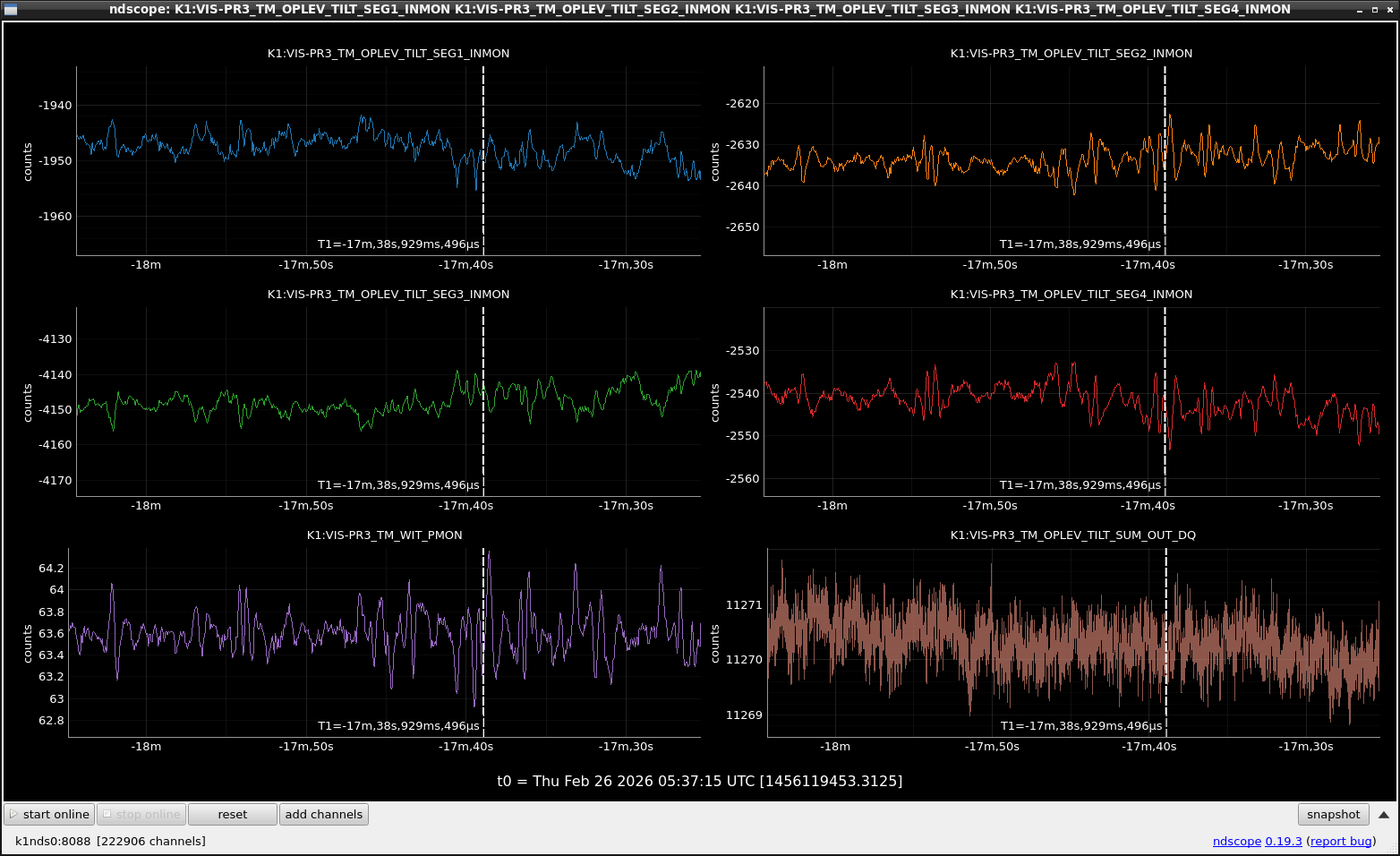## What we did on 2026.02.27
We engaged the high-bandwidth ASCs for both P and Y directions. As soon as engaging ASCs, DHARD_{P,Y} started oscillated at some high-frequecies, 15-18 Hz. We tried to solve the issue by implementing a bandstop filter between 14-20 Hz. Then, the oscillations at their frequencies seems to be stoppped but sometimes 15 Hz oscillation raise up like glitch (fig.1). If the glitch was large, IFO got down. We found that IM actuator was saturated at this timing (fig.2) (When I wrote this log, I found TM was also saturated). Since we just use IM to damp the 3 Hz mode in Yaw but the feedback to IM above 3 Hz was not cut at that time, we implemented 3 Hz bandpath filter in FM2 of IM_LOCK_Y. Thanks to this, we avoid the IM actuator saturation (but TM was still saturated.) (fig.3) We succeeded in enhance the lock duration from several minites to 10-15 minites. However, lock loss itself by 15 Hz seems to be remained (maybe due to TM saturarion). So we implemented the 15 Hz notch filter for {D,C]HARD_{P,Y} instead of the bandstop filter.
Next, we found that the 2 Hz oscillation grow up 10-15 minites after ASCs were engaged (fig.4). As the 2.2 Hz oscillation was larger, L_RMS seems to get larger. At last, L_RMS surpassed the thereshold and the the IFO got down (fig.5). We found that ETMY Y still oscilllated even though ASC was already disengaged. We found only ETMY had no 2.1 Hz mode NBDAMP for some reason. So we implemented the damping control for 2.1 Hz mode in ETMY_NBDAMP_Y4 (fig.6). Then, 2.1 Hz oscillation seems to disappeared (fig.7).
After that, we measured the OLTFs of ARM DoFs, except for {D,C}SOFT_P (Sorry, I gave up to measure them last night). Fig.8, 9, 10, and 11 show the results of Yaw loops.
- As for C{HARD, SOFT}_Y, The gain in DC seems to be smaller than the ones when only Yaw HB ASCs were engaged.
- As for DSOFT_Y, we could not measure it well.
- As for DHARD_Y, the large 15 Hz peak appeared in the TF from OUT to IN1. Also, the shape of the TF above 10 Hz seems to be strange.
Fig. 11 and 12 show the results of {D,C}HARD_P.
- In the DHARD_P OLTF (cyan line), the gain shape around 10 Hz seems to be strange. I found that I forgot to turned off the ITMX_TM_LOCK_P path. After that, we obtained the red lines. The strange shape at 10 Hz disappeared.
- This time, I did not remeasure DHARD_Y TFs to check the effect of TM_P path, especially 10 Hz. We need to check it later.
- As for CHARD_P, TF structures seems to be changed. During the measurement, though we excited DHARD_Y but CHARD_P was excited more (fig.13).
Totally, some large couplings in the loops remains in the loops.
Now the causes of the lockloss are categorized to 2 topics; glitches, and 1.14 Hz oscillation.
- The glitches remains even after the above adjustement. One of the possibilites is that the control noise kickes the suspension. The DARM spectrum from 10 Hz to 100 Hz got worse whole the HB ASCs were engaged (fig.14) maybe becasue the attenuation by roll off is not enough in the MN stage. According to the cryopayload eignemode list (JGWdoc), at 15.88 Hz, there is the TM V mode. The MN_P feedback kick this?
- As for 1.1 Hz oscillation, this oscillation appeared again after the above adjustement (fig.15).
## Next (maybe after the achievement of the RSE LSC lock acquistion.)
- decouple sensors and actuators more precisely
- redesign hierarichal actuator including roll off in each stage to solve the glitch and oscillation issue.

































































